 |
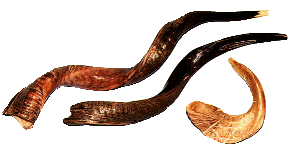 |
The month of Elul is the final month in the Jewish year. That month is a time for prayer, self introspection, and repentance. It is a time of intense spiritual preparation for the coming year and the upcoming holiday of Rosh Hashanah. In 2003 the month of Elul began on August 28, 2003 and lasted through September 26, 2003.
Rosh Hashanah is the first and second days of the first Jewish month of Tishrei. In 2003 the Jewish year 5763 began Friday evening, September 26th and continued until Sunday evening, September 28th. Rosh Hashanah marks the beginning of the Jewish new year. The celebration of this holiday is marked with solemnity, as it is the day on which the whole world is judged for the coming year. Rosh Hashanah is the birthday of the world, as it was on this day that G-d created Man on the 6th day of creation. Every year, on this day, G-d is proclaimed as the one and true King.
The Bible doesn't refer to the holiday
as Rosh Hashanah but rather as Yom Ha-Zikkaron (The Day of Remembrance) or Yom
Teruah (The Day of the Sounding of the Shofar). Rosh Hashanah, the name
by which it is called today, means "head of the year" or "first of the year."
"Speak to the sons of Israel, saying, 'In the seventh month on the first of the month, you shall have a rest, a reminder by blowing of trumpets, a holy convocation. You shall not do any laborious work, but you shall present an offering by fire to the LORD."
Leviticus
23:24-25
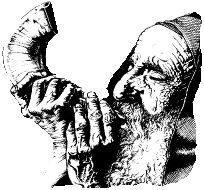
~~Feast of Trumpets~~
According to Scripture, it is useful to study the time of Christ's coming. Consider the following verse about knowing the time of the Messiah's coming:
"Of this salvation the prophets have inquired and searched carefully, who prophesied of the grace that would come to you, searching what, or what manner of time, the Spirit of Christ who was in them was indicating when He testified beforehand the sufferings of Christ and the glories that would follow."
1 Pet 1:10-11
So the prophets sought to know the time and events of Christ's coming.
The feasts give us an amazing link that direct us to watch for the return of the Messiah.
~~Agricultural Seasons~~
|
|
Biblical feasts relate to agricultural seasons. For instance, farmers began to harvest crops in the spring and finished the harvest in autumn. Early crops such as barley and wheat were harvested in the spring. The summertime harvest included crops like cucumbers, watermelons, and tomatoes. However, autumn brought the final harvest with great abundance. |
|
|
What is the link between the agricultural seasons and the appearing of the Messiah? Jesus' first appearing occurred at the springtime harvest feasts (Passover, First Fruits, Pentecost). |
|
|
The summertime has no biblical feasts. |
|
|
The autumn brings a new set of feasts with prophetic links. |
|
|
Will Jesus return to earth at the autumn feasts for the final harvest? Something to think about! |
~~First Autumn Feast~~
The first autumn feast is called the Feast of Trumpets.
|
|
Throughout the New Testament, biblical authors tie the blowing of trumpets to Christ's return. "He will send his angels with a loud trumpet call, and they will gather his elect from the four winds, from one end of the heavens to the other." Matt. 24:31 |
|
|
Since trumpets
relate to Jesus coming again, what did Moses write about the Feast of
Trumpets? "On the first day of the seventh month
you are to have a day of rest, a sacred assembly commemorated with
trumpet blasts. Do no regular work, but present an offering made to the
Lord by fire."
Lev. 23:23-25
|
|
|
This verse tells us that the Feast of Trumpets occurs on the first day of the seventh Hebrew month, which is the Jewish New Year (Rosh Hashanah on your calendar). The Feast of Trumpets, just like Passover, is not a day that disappeared millennia ago. |
The Feast of Trumpets (Rosh ha-Shanah) is the traditional Jewish New Year. The Bible says less about this feast than any other. We do know that it was to be a holy day celebrated with trumpet blasts of the shofar (a trumpet made from a ram's horn).
Trumpet calls were associated with the calling of a holy assembly, a warning of danger, or the arrival of a king. Rosh ha-Shanah is celebrated today with several different blasts of the shofar.
It is a very solemn time, just preceding the holiest day of all, the Day of Atonement (Yom Kippur). The 10 days from Rosh ha-Shanah through Yom Kippur are called the "Days of Awe." During those days one considers his sins before God and enters a period of repentance; of asking for forgiveness from God and those one has harmed and of restitution.
In the rabbinical literature, there are many details that are quite provocative. Among the most significant is the use of the shofar, the ram's horn, instead of the usual silver temple trumpets.
(If you visit the Temple Institute in Jerusalem, you can see the silver trumpets that have been fashioned for use in the coming Temple.)
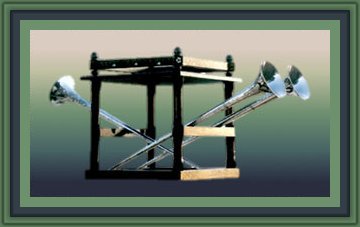
The shofar is associated with the Akedah, Abraham's offering of Isaac on Mount Moriah, as detailed in Genesis 22.

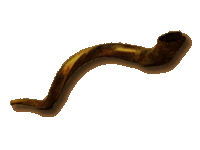 |
Rabbinical tradition associates the left horn of the ram as the "first trump" and the right horn as the "last trump." |
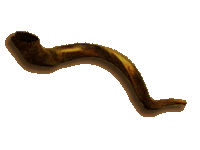 |
During the blowing of the shofar on Rosh Hashana there are three distinct sounds. Below are samples of those sounds.
| Tekiah: one long, straight blast | Shevarim: three medium, wailing sounds | Teruah: nine quick blasts in short succession |
|
|
|
|
A distinguishing feature of the celebration is the last, climactic blast, the Teki'at Shofar. This is not the usual series of short bursts, signaling alarm or bad news. Rather, it is a long blast, signaling victory or good news. It is this last blast that is referred to as the last trump.
| Time is Running Out! |
 |
~~The Feast of Trumpets to the Christians~~
The Feast of Trumpets is not specifically mentioned in the New Testament, but it reminds the Christian of two coming events that will be heralded by trumpet blasts. "And he shall send his angels with a great sound of a trumpet, and they shall gather together his elect from the four winds, from one end of heaven to the other." Matthew 24:31
"In a moment, in the twinkling of an eye, at the last trump: for the trumpet shall sound, and the dead shall be raised incorruptible, and we shall be changed." 1Corinthians 15:52
The rapture of the church as described in the above verses is the next event on God's prophetic calendar.
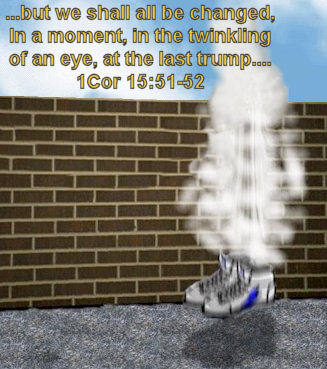
"For the Lord Himself will descend from heaven with a shout, with the voice of the archangel, and with the trumpet of God; and the dead in Christ shall rise first. Then we who are alive and remain shall be caught up together with them in the clouds to meet the Lord in the air, and thus we shall always be with the Lord." 1 Thessalonians 4:16-17
Christ Jesus, the Lord, will return again to the earth.
"And then the sign of the Son of Man will appear in the sky, and then all the tribes of the earth will mourn, and they will see the SON OF MAN COMING ON THE CLOUDS OF THE SKY with power and great glory. And He will send forth His angels with A GREAT TRUMPET and THEY WILL GATHER TOGETHER His elect from the four winds, from one end of the sky to the other." Matthew 24:30-31
Compare to: "And the seventh angel sounded [a trumpet]; and there were great voices in heaven, saying, The kingdoms of this world are become the kingdoms of our Lord, and of his Christ; and he shall reign for ever and ever." Revelation 11:15
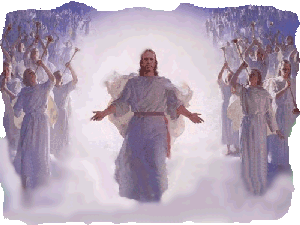
"L'shana Tova -- Ketivah vi-chatima Tova"
is customary to greet others with the words: "L'shana Tova -- Ketivah vi-chatima Tova." This means: "For a good year -- You should be written and sealed in the good Book [of Life]."
Following Rosh Hashanah are the Days of Awe:

Shalom and blessings, bj
References:
Chuck Missler
Temple Institute
http://torah.org/
www.aish.com
http://www.jewfaq.org/


|
|